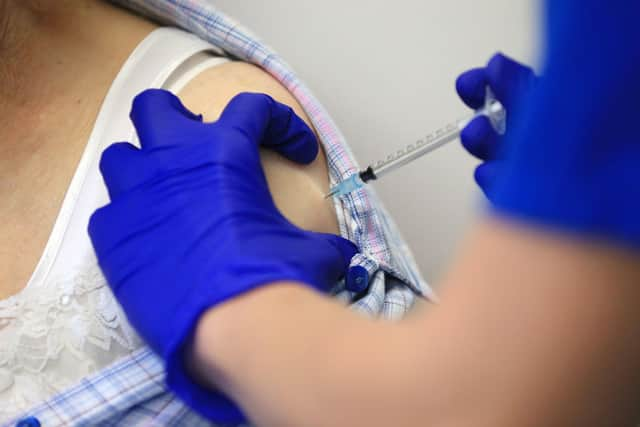Covid-19 vaccines, microchip trackers and blood clots - Sheffield pharmacist speaks out about those rumours, myths and conspiracy theories
and live on Freeview channel 276
More than 26 million people in the UK have received at least one dose of a COVID-19 vaccine as part of the biggest inoculation programme the country has ever seen. However, with uptake lower amongst black and minority ethnic communities compared with white ethnicities, Sheffield pharmacist Hina Khan hopes to encourage people in her local community to have confidence in the vaccine by dispelling common myths about it.
Boots pharmacist, Hina Khan, said: “As a local pharmacist, I would like to reassure people that the vaccine has a good safety profile, having gone through robust and extensive trials. In fact, the vaccine is the most effective way to protect ourselves.
Advertisement
Hide AdAdvertisement
Hide Ad“In an area as diverse as Sheffield, it is even more important that the community has confidence in the vaccine, as there is less uptake among black and minority ethnic communities compared to white ethnicities. I encourage everyone to ensure that they attend their vaccine appointment as soon as they receive their invitation from the NHS.”
Here are the eight most common COVID-19 myths according to Hina Khan, from variations in effectiveness based on ethnicity to infertility fears, alongside her science-based rebuttals.
Myth #1: The vaccine contains a microchip
According to the pharmacist, there is zero evidence to rumours that the vaccine contains a microchip or any other kind of surveillance tracker.
The COVID-19 vaccine has been approved by independent medicines organisations around the world and none found any of these kinds of devices in them.


Myth #2: The vaccine contains pork and alcohol
Advertisement
Hide AdAdvertisement
Hide AdHina said: “I get this question a lot in the pharmacy from patients with religious dietary restrictions. None of the vaccines contain any ingredients derived from animals – so there is no pork, beef or anything else.
“Some of the vaccines – like Oxford/AstraZeneca – contain naturally occurring alcohol, but at an amount that is less than you would find in a slice of bread.
"The British Islamic Medical Association and the Mosques and Imams National Advisory Board have said this is permitted and are encouraging Muslims to get vaccinated.”
Myth #3: The Oxford-AstraZeneca vaccine gives you blood clots. It might not be safe.
Advertisement
Hide AdAdvertisement
Hide Ad“A number of experts have closely reviewed the data, and the evidence available does not suggest that blood clots are caused by the Oxford-AstraZeneca COVID-19 vaccine.
"The UK regulator of medicines and medical devices, the Medicines and Healthcare products Regulatory Agency, has confirmed that the benefits of the vaccine in preventing COVID-19 far outweigh any risks.
"The regulators will continue to monitor the safety of the vaccine closely. It is important that people continue to go and get their COVID-19 vaccine when invited to do so.”
Myth #4: The vaccine will affect my DNA
“I think this myth about the vaccine tampering with our DNA has really taken hold because some of the vaccines use a new technology called mRNA.
Advertisement
Hide AdAdvertisement
Hide Ad"The mRNA ingredient – found in Pfizer-BioNTech and Moderna – teach our cells to make proteins that trigger our immune system to defend us against the virus.
"The mRNA is not able to enter the nucleus of our body’s cells, which is where our DNA is stored. After a few days, the mRNA is broken down and removed, by which time our bodies have produced a lot of protein to stimulate the immune response.”
Myth #5: The vaccine could not have been developed in such a short space of time
“The fast development of the COVID-19 vaccine was definitely unprecedented, but that’s because of the global effort and investment that went into this.
Advertisement
Hide AdAdvertisement
Hide Ad"It was made a priority for governments around the world due to the impact of coronavirus on healthcare systems and economies, as we’ve all seen.
"That doesn’t mean that trials were any less rigorous though – and the vaccines are approved by the UK’s medicines regulatory body, MHRA.”
Myth #6: The vaccination does not work for people from BAME backgrounds
“There’s no evidence that either of the two vaccines being administered widely in the UK work differently according to ethnicity.
Advertisement
Hide AdAdvertisement
Hide Ad"In fact, 11 per cent of people that took part in the clinical trials for the Oxford/AstraZeneca vaccine and 13 per cent for the Pfizer-BioNTech were from black African- Caribbean and Asian backgrounds.
"No differences in effectiveness were reported in these trials based on ethnicity.”
Myth #7: the vaccine makes you sick after you take it and can have long term side effects
“You may experience mild side effects after getting the COVID-19 vaccine. Common ones include tenderness, swelling, and redness in your arm, headaches and tiredness that can last for a couple of days.
Advertisement
Hide AdAdvertisement
Hide Ad"The vaccine has been thoroughly tested in clinical trials, with no long-term complications reported.”
Myth #8: The vaccine can make you infertile
If you are planning to start a family, there is no need to worry about having a COVID-19 vaccine – there is no clinical evidence to suggest that it affects male or female fertility.
Hina said: "I think this myth has spread because right now, pregnant women are not routinely being offered the vaccine. That is because the vaccines haven’t yet been tested in pregnant women so, until more information is available, expecting mothers will not be routinely vaccinated.
"If you are pregnant and think you are at high risk of catching the infection or have clinical conditions that may put you at high risk of suffering serious complications from COVID-19, you should discuss the vaccination with your doctor or nurse.”